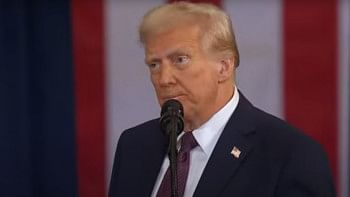Wimbledon calls time on line judges in favour of electronic system

Wimbledon will break with tradition and replace line judges with electronic line calling from next year's championships, the All England Club confirmed on Wednesday.
The sight of immaculately-dressed line judges standing or crouching at the side and back of the grass courts has been a feature at the Grand Slam for 147 years.
Electronic line calling was first used as an experiment at the ATP Next Gen Finals in Milan in 2017 and was adopted more widely during the COVID-19 pandemic. It will be used on all courts across ATP Tour events from 2025.
The Australian Open and U.S. Open have already replaced line judges with electronic calling although the French Open still relies on the human eye.
Wimbledon said the Hawk Eye Live Electronic Line Calling (Live ELC) will also be used across the qualifying tournament.
"Having reviewed the results of the testing undertaken at The Championships this year, we consider the technology to be sufficiently robust and the time is right to take this important step in seeking maximum accuracy in our officiating," AELTC chief executive Sally Bolton said in a statement.
"For the players, it will offer them the same conditions they have played under at a number of other events on tour."
While popular with players, the decision will sadden traditionalists and likely mean the end of the arguments over line calls that are part of Wimbledon folklore, largely because of the antics of former champion John McEnroe who famously railed against the officials.
It will also spell the end of the Hawk Eye challenges in which players can ask for a video review of a close call -- also a popular feature with fans.
Chair umpires will be retained.
"We take our responsibility to balance tradition and innovation at Wimbledon very seriously," Bolton added. "Line umpires have played a central role in our officiating at The Championships for many decades and we recognise their valuable contribution and thank them for their commitment and service."
The electronic system, which reacts within one tenth of a second of the ball landing, is regarded as more accurate than human line judges who are often seen ducking for cover to avoid being struck by a 100mph serve.
A simple computer-generated call of 'out' or 'fault' will now be the final word on line calls.
In another change for the 138th Wimbledon, the women's and men's singles finals on the second Saturday and Sunday respectively will start at the later hour of 1600 local time, after the men's and women's doubles finals.
"The doubles players competing in the finals will have increased certainty over their schedule and fans will enjoy each day's play as it builds towards the crescendo of the ladies' and gentlemen's singles finals with our champions being crowned in front of the largest possible worldwide audience," Bolton said.


 For all latest news, follow The Daily Star's Google News channel.
For all latest news, follow The Daily Star's Google News channel. 



Comments